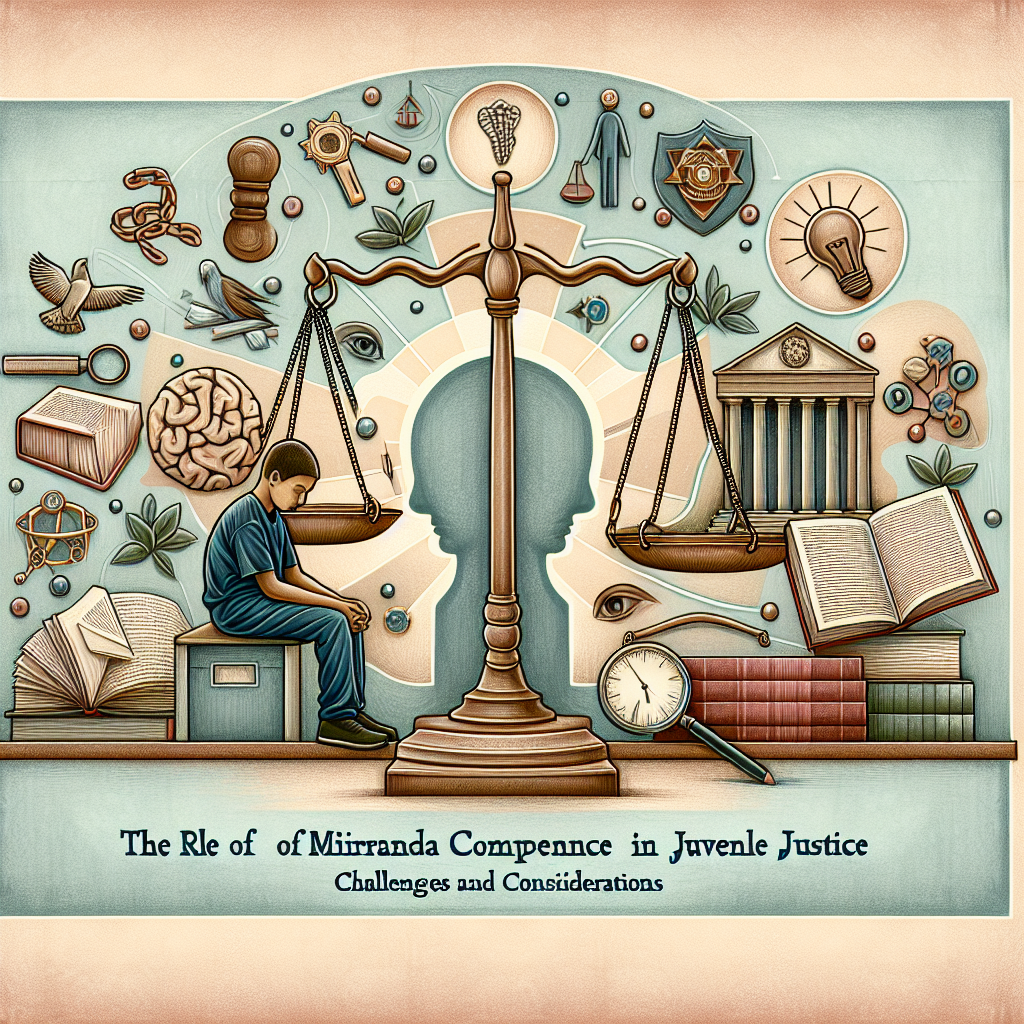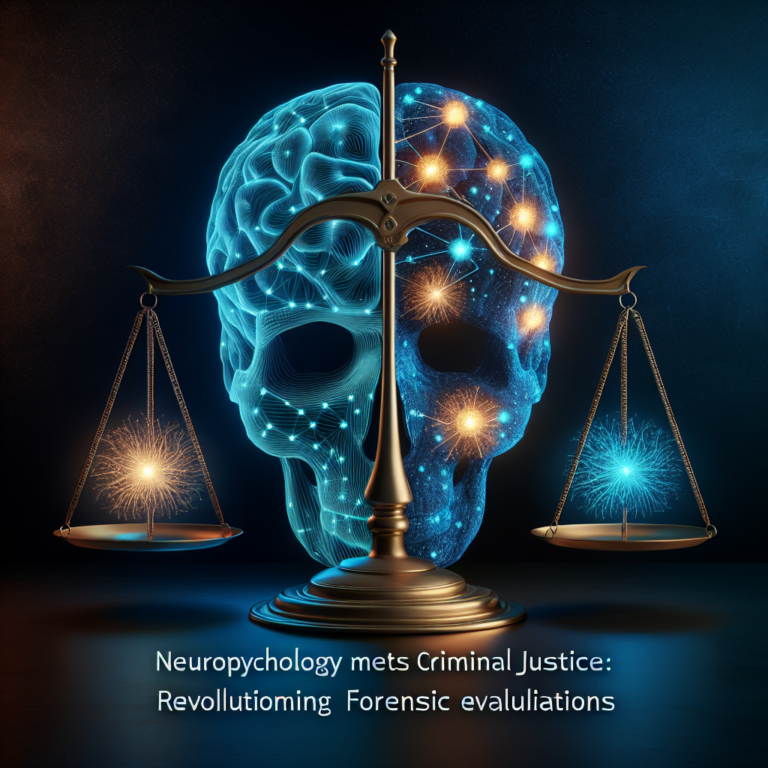
Introduction
Imagine a 16-year-old, distraught and confused, sitting in an interrogation room. The gravity of the situation weighs heavily, yet the language and pressures of the environment escalate. This scene is alarmingly common in juvenile justice systems across the country, where the nuances of Miranda competence become crucial. Understanding “The Role of Miranda Competence in Juvenile Justice: Challenges and Considerations” is vital for ensuring that young individuals are not only treated justly but also have the capability to comprehend their rights in emotionally taxing situations.
As concerns about juvenile crime and systemic inequities continue to rise, the importance of Miranda competence in juvenile justice cannot be overstated. This article seeks to explore the multifaceted role of Miranda competence, the challenges it faces, and the ethical considerations involved, all while appealing to both legal professionals and concerned citizens alike.
Understanding Miranda Competence
What is Miranda Competence?
Miranda competence refers to an individual’s ability to understand and waive their rights as stipulated by the Miranda warning, which includes the right to remain silent and the right to an attorney. For juveniles, age, cognitive development, and emotional maturity all play pivotal roles in determining this competence.
The Legal Framework
The Miranda rights emerged from the landmark U.S. Supreme Court case Miranda v. Arizona (1966). This case established that detained individuals must be informed of their rights before any interrogation. However, the application of these rights becomes intricate in the realm of juvenile justice, calling for specialized attention.
Key Considerations in Miranda Competence
- Age and Legal Understanding: Younger individuals often lack the comprehension of complex legal terminology.
- Cognitive Development: Several studies indicate that cognitive maturity continues to grow into the early 20s. Thus, a 15-year-old may not fully grasp the implications of waiving their rights.
- Emotional Factors: Stress and fear can severely impair decision-making skills, a scenario often overlooked in juvenile settings.
The Impact of Miranda Competence on Juvenile Justice
Challenges Faced
1. Interrogation Techniques
Various psychological tactics used during interrogations can manipulate a juvenile’s understanding and perception of their rights. For instance, if a juvenile is told that cooperating will lead to leniency, they may waive their rights without truly comprehending the ramifications.
| Technique | Description | Impact on Juveniles |
|---|---|---|
| Positive Reinforcement | Promises of favor or leniency | May induce waiver of rights |
| Isolation | Long periods alone to build anxiety | Impairs cognitive function |
| Misleading Questions | Phrasing that suggests guilt or inevitability | Causes confusion and fear |
2. Systemic Barriers
Many juvenile systems are not equipped to address the specific needs surrounding Miranda competence. Resources such as legal counsel are often lacking, leading to a culture where rights may be unintentionally waived.
Real-World Case Studies
Case Study 1: In re Gault (1967)
In this landmark case, Gerald Gault, a 15-year-old, was accused of making an obscene phone call. The court found that he had not been informed of his rights, underscoring the necessity of Miranda competence. The Gault decision established that juveniles deserve similar legal protections as adults, marking an essential moment in the evolution of juvenile justice.
Analysis: This case illustrates the critical nature of Miranda competence, emphasizing that juveniles must be aware of their rights to ensure fair trial standards.
Case Study 2: J.D.B. v. North Carolina (2011)
This case involved a middle school student questioned by police on school property without being read his Miranda rights. The U.S. Supreme Court ruled that a child’s age must be considered in the context of custody, thereby impacting the determination of Miranda competence.
Analysis: Here, the court highlighted the importance of considering age in understanding Miranda rights, indicating that the juvenile’s perception of their situation significantly influences their competence.
Ethical Considerations
The Balance Between Justice and Protection
Compromising a juvenile’s ability to understand their rights poses significant moral dilemmas. Legal professionals must navigate the fine line between enforcing the law and ensuring that young individuals are not unduly burdened by a system that may fail to protect them.
A Call to Action: Improving Miranda Competence
1. Training for Law Enforcement
Police officers and interrogators should receive specialized training focusing on juvenile psychology and development. Understanding the cognitive and emotional factors affecting juveniles’ decision-making processes is essential in fostering a more humane approach to interrogations.
2. Legal Representation
Ensuring that juveniles have access to robust legal counsel during interrogations can significantly enhance their ability to understand their rights. Policies mandating the presence of a guardian or attorney can serve as safeguards for juvenile rights.
Conclusion
The landscape of juvenile justice is fraught with challenges, and navigating The Role of Miranda Competence in Juvenile Justice: Challenges and Considerations is essential for promoting fair treatment for youths. By recognizing the unique vulnerabilities of juveniles and implementing structured reforms, society can aim for a justice system that protects, rather than exploits.
As advocates, professionals, and concerned citizens, we must work together to improve young people’s experiences within the justice system, ensuring that their voices are heard and their rights are fully protected.
FAQs
1. What constitutes Miranda competence in youths?
Miranda competence in youths is the ability of a juvenile to understand their rights and the implications of waiving them during an interrogation. Factors such as age, cognitive ability, and emotional maturity significantly influence this capacity.
2. Do juveniles have the same rights as adults?
Yes, juveniles have the right to be informed of their Miranda rights, just like adults. However, the interpretation and application may vary due to their developmental stage.
3. How can law enforcement improve practices related to juvenile interrogations?
Training focused on youth psychology, better communication strategies tailored to younger individuals, and ensuring legal representation can significantly improve interrogation practices.
4. Are there legal protections specifically for juveniles?
Yes, various legal standards and protections exist for juvenile justice, primarily aimed at addressing their unique needs and vulnerabilities in the legal system.
5. What happens if a juvenile waives their rights and later claims they didn’t understand?
If a juvenile waives their rights and later claims a lack of understanding, courts may review the circumstances surrounding the waiver. Factors such as the juvenile’s age, cognitive abilities, and the interrogation conditions will be examined to determine if the waiver was indeed valid.
This comprehensive exploration of The Role of Miranda Competence in Juvenile Justice: Challenges and Considerations serves not only as an educational piece but also as a rallying cry for those invested in juvenile justice reform. Together, we must advocate for a system that recognizes the complexities of youth cognition and emotion.















